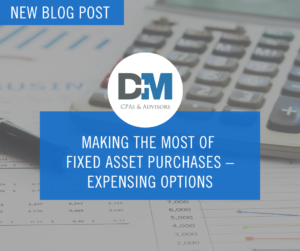Making the Most of Fixed Asset Purchases – Expensing Options

Let’s review some options to reduce taxable income through expensing of fixed asset purchases and, in some cases, improvements. To count as a 2022 purchase, the item(s) must be placed in service (used for its intended purpose) by December 31st.
Tangible Personal Property Regulations
In late 2013, the IRS issued final regulations providing rules on the treatment of expenditures for improving, maintaining or purchasing tangible property. The regulations provided a de minimis safe harbor election which allows taxpayers to expense additions below a de minimis amount. If you have an applicable financial statement (AFS) which one qualifying option is audited financial statements, any item(s) below $5,000 per invoice or item may be expensed. Without an AFS, say you have a tax return or compilation, the limit is $2,500.
Many items like computers or furniture can simply be expensed as repairs and maintenance when purchased as the cost of the item is below the $2500 limit. Other items, such as a membrane roof replacement or thin coat parking lot surface, qualify as repairs even though the amount far exceeds the limit.
Section 179 Expensing
Property (new and used) purchased for an active trade or business qualifies for section 179. The deduction is taken the year property is placed in service. For 2022, the 179-expensing limit is $1,080,000, with a spending cap of $2,700,000.
Changes effective in 2018 also expand the use of 179 to improvements made to nonresidential real estate. Essentially, this covers improvements to a building’s interior.
One downside to section 179 is the deduction cannot exceed business income – i.e., create a loss. Bonus depreciation (covered below) has no such limitation.
Bonus Depreciation
As mentioned above, the most valuable bonus depreciation feature may be the ability to enhance or create a loss by expensing acquisitions. For 2022, the bonus depreciation limit is 100% of qualified property. Generally, it also includes used property (new to the taxpayer) if certain conditions are met.
2022 is the last year for a 100% bonus. It decreases to 80% in 2023 and drops to 20% after 2025.
Contact your Dent Moses advisor to help you navigate the various options.